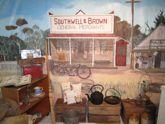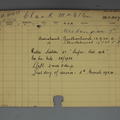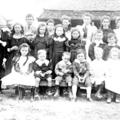Clark (nee Maher), Mrs Ellen Agnes
Ellen Agnes Clark
Ellen was born at Binalong in 1868, the daughter of Michael and Honora Maher. She had no teaching qualifications, which means she probably began in the profession as a pupil teacher. In 1889 she was transferred from her first appointment at Merrill Creek (near Dalton) and employed to open the provisional school at Boambola, five miles from Murrumbateman. She accepted board at Mrs Frankum's, ¼ mile from the school. In May 1891 she asked the new Yass inspector, Patrick Sheehy, whether a female teacher could continue to hold her position after marriage. Uncertain about the matter, the Inspector sought higher advice and was instructed to inform Miss Maher 'there is no rule on the subject'. The next month, Ellen Maher forwarded her marriage certificate to the Department. She had married Thomas Kennedy Clark of Murrumbateman, at St Clements, Yass, on 13th June and their first child was born that same year.
As a married mother Mrs Clark would have been expected to cease working (had she been a classified teacher she would have been required to resign on marriage) but it was difficult to find teachers of any sort for provisional schools in the bush and she was kept on. Indeed, she was transferred to Weetangera in 1894, husband, child and all.
There, perhaps confident in the knowledge that she would be difficult to replace, she had a second child. There was advantage in the married state in that it insulated her from the gossip and innuendo that had dogged her unmarried predecessor, Nellie Downing. Instead, the same self-appointed nemesis questioned Mrs Clark's competence. The children did not improve, this busybody wrote to the Minister: there was not enough sewing or singing or drill; the teacher, 'encumbered' by a family, could not attend to duty as well as one without; the Minister should appoint 'a better teacher'. The local inspector invited Mrs Clark to respond, which she did in terms that left no doubt about the difficulties that faced women forced into unconventional roles.
"My husband is not dependent on me for support. It was never his wish that I would retain my position after our marriage, but on account of his blighted prospects (unspecified) I resolved that I would help to earn a livelihood. I employ a housekeeper, so the household duties and the care of the children do not involve (sic) upon me. Honestly speaking, I have been more attentive to my duties since my marriage than before, knowing from my knowledge of the world in general that my actions would be more closely regarded".
Inspector Sheedy reported to his superiors that the complaint was without substance except about the singing, which Mrs Clark was not required to teach.
The family struggled. She sought permission to take supplementary outside employment in the form of teaching piano on Saturday mornings. Every two years she sat for the examination for grade IIIC (entry level) teacher and each time failed. Geography, history and vocal music were her undoing and in time she began to fail subjects that she had formerly passed. Fortunately it made no difference to her position because Weetangera had only once, several years previously, had sufficient pupils to be designated a Public School and never did again. Her husband appears to have had difficulty finding employment until he was appointed postmaster, which supplemented her income of £88 (less £12 deducted for rent) by all of twelve pounds and ten shillings per annum. The Post Office was an enclosed verandah of the teacher's residence.
Mrs Clark tried other avenues. If she obtained the necessary qualification could she be appointed as a teacher of needlework? No, replied the department, Work Mistress positions are reserved for the widows of teachers. Could she have forage allowance for the horse they had to keep to fetch provisions from the nearest store, six miles away at Hall? No. Then perhaps she might be excused rent on the slab residence, unoccupied 16 years before her arrival and now declared unfit for habitation even by the inspector? Oh very well, if there is no alternative short of a new residence.
It is not hard to see how someone allowed so little slack herself might take the same approach to others. She was a noted disciplinarian who made free with the stick. The girls had a playground chant: 'Old Nell should be in hell!' It was some years before a parent could dissuade her from caning them. Isabel Shumack simply said 'I got the stick for everything'. The boys suffered as many as 24 cuts at a time. George Shumack was driven to rooting out the ti-tree that provided the means. Yet the consensus among the victims in later years was that Mrs Clark had been a good teacher.
A school photograph from about 1901 shows an unsmiling woman stylishly dressed in a long dark skirt and a mutton-sleeved striped blouse. The straw hat perched on her netted hair might suggest a lady cyclist, but for that we can blame the machine in the foreground, which is probably her sons' tricycle. She suffered in the Canberra winters and sought transfer to (?) or the south coast, again without success.
Twenty six years after setting up house in a slab hut, Mrs Clark learned that it was to be replaced with a new weatherboard residence. Before it could be built she took long service leave and never returned. She secured a position at Sutherland in Sydney (qualification?) and taught there until retirement in 1926.
Without unqualified teachers like Ellen Clark the NSW education system could not have grown as rapidly nor reached as far as it did in the late nineteenth century. For all their limitations, it was Mrs Clark and her peers that first lit the lamp of learning for the great majority of children in the Australian bush.
[reference: M. Clough, Spilt Milk: A History of Weetangera School 1875-2004, Weetangera School, Weetangera, 2004, quotes from pp. 27-9, pp. 32-3
Ellen Agnes Maher biodata:
Born at Binalong in 1868.
Married Thomas Clark in 1891.
Taught at Boambolo in 1889
Taught at Weetangera from 1894-1920.
Took long service leave, subsequently posted to Sutherland School in Sydney.
Retired in 1926.
Died at Kogarah in 1956.
Schools
- Boambolo
01/1889 - 06/1894 - Weetangera School
07/1894 - 01/1920



